Marketing Role in Travel and Tourism: A Thomas Cook Analysis
VerifiedAdded on 2019/12/04
|16
|5648
|129
Report
AI Summary
This report analyzes marketing strategies within the travel and tourism sector, with a specific focus on the application of marketing principles by international travel companies such as Thomas Cook. The report delves into core marketing concepts, including market segmentation, consumer motivation and demand, and the impact of the marketing environment on businesses and destinations. It explores strategic marketing planning, the role of marketing research, and the influence of marketing on society. The report also examines the product, price, and place elements of the marketing mix, along with the importance of service sector mix elements and the concept of the total tourism product. Furthermore, it discusses the integrated nature of the promotional mix and includes a plan for an integrated promotional campaign. The analysis uses PESTLE analysis for Thomas Cook's destination packages, highlighting political, economic, social, technological, environmental, and legal factors. The report underscores the importance of understanding consumer behavior and market segmentation for effective marketing planning, which is crucial for success in the competitive travel and tourism industry.
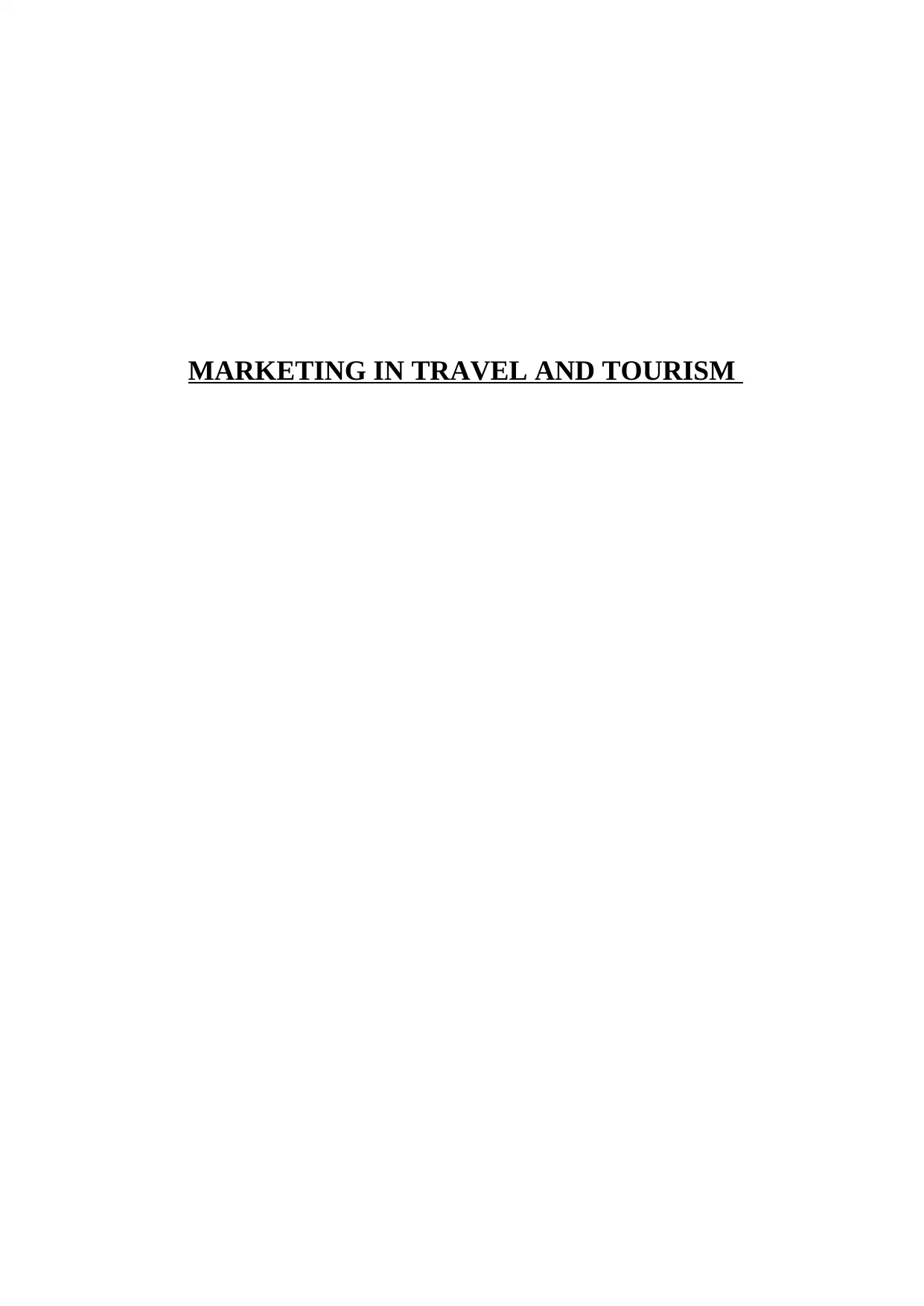
MARKETING IN TRAVEL AND TOURISM
Paraphrase This Document
Need a fresh take? Get an instant paraphrase of this document with our AI Paraphraser
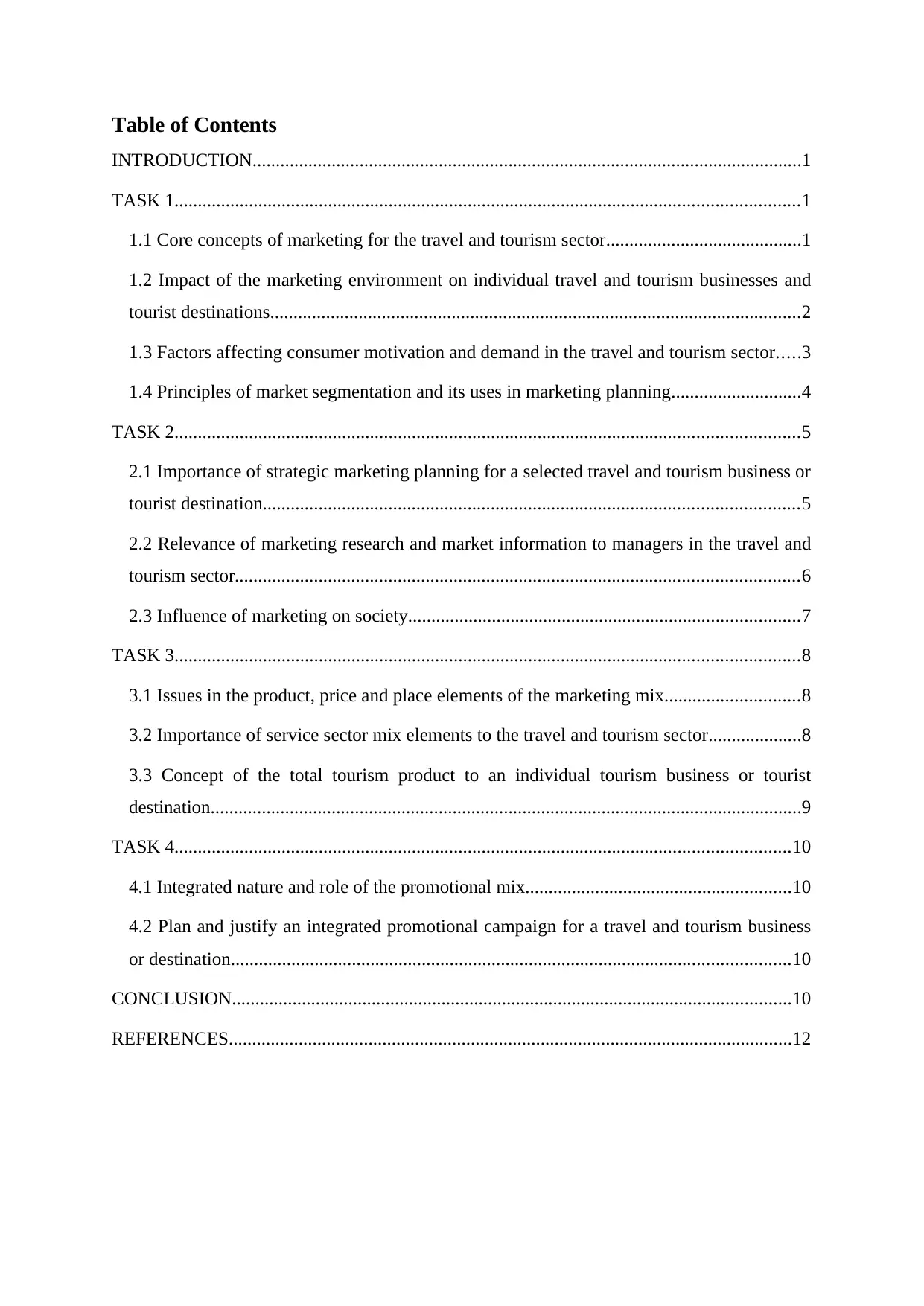
Table of Contents
INTRODUCTION......................................................................................................................1
TASK 1......................................................................................................................................1
1.1 Core concepts of marketing for the travel and tourism sector..........................................1
1.2 Impact of the marketing environment on individual travel and tourism businesses and
tourist destinations..................................................................................................................2
1.3 Factors affecting consumer motivation and demand in the travel and tourism sector.....3
1.4 Principles of market segmentation and its uses in marketing planning............................4
TASK 2......................................................................................................................................5
2.1 Importance of strategic marketing planning for a selected travel and tourism business or
tourist destination...................................................................................................................5
2.2 Relevance of marketing research and market information to managers in the travel and
tourism sector.........................................................................................................................6
2.3 Influence of marketing on society....................................................................................7
TASK 3......................................................................................................................................8
3.1 Issues in the product, price and place elements of the marketing mix.............................8
3.2 Importance of service sector mix elements to the travel and tourism sector....................8
3.3 Concept of the total tourism product to an individual tourism business or tourist
destination...............................................................................................................................9
TASK 4....................................................................................................................................10
4.1 Integrated nature and role of the promotional mix.........................................................10
4.2 Plan and justify an integrated promotional campaign for a travel and tourism business
or destination........................................................................................................................10
CONCLUSION........................................................................................................................10
REFERENCES.........................................................................................................................12
INTRODUCTION......................................................................................................................1
TASK 1......................................................................................................................................1
1.1 Core concepts of marketing for the travel and tourism sector..........................................1
1.2 Impact of the marketing environment on individual travel and tourism businesses and
tourist destinations..................................................................................................................2
1.3 Factors affecting consumer motivation and demand in the travel and tourism sector.....3
1.4 Principles of market segmentation and its uses in marketing planning............................4
TASK 2......................................................................................................................................5
2.1 Importance of strategic marketing planning for a selected travel and tourism business or
tourist destination...................................................................................................................5
2.2 Relevance of marketing research and market information to managers in the travel and
tourism sector.........................................................................................................................6
2.3 Influence of marketing on society....................................................................................7
TASK 3......................................................................................................................................8
3.1 Issues in the product, price and place elements of the marketing mix.............................8
3.2 Importance of service sector mix elements to the travel and tourism sector....................8
3.3 Concept of the total tourism product to an individual tourism business or tourist
destination...............................................................................................................................9
TASK 4....................................................................................................................................10
4.1 Integrated nature and role of the promotional mix.........................................................10
4.2 Plan and justify an integrated promotional campaign for a travel and tourism business
or destination........................................................................................................................10
CONCLUSION........................................................................................................................10
REFERENCES.........................................................................................................................12
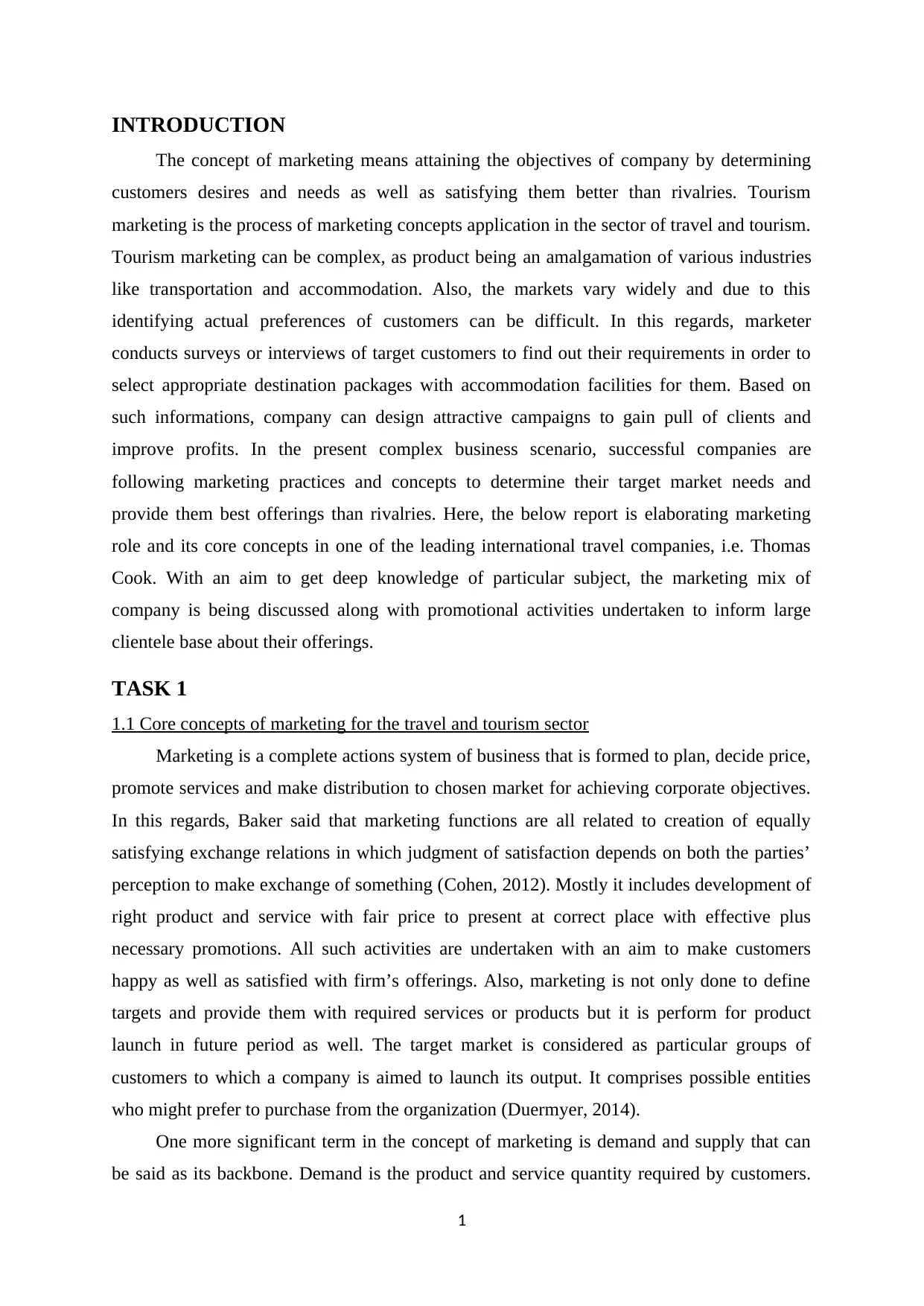
INTRODUCTION
The concept of marketing means attaining the objectives of company by determining
customers desires and needs as well as satisfying them better than rivalries. Tourism
marketing is the process of marketing concepts application in the sector of travel and tourism.
Tourism marketing can be complex, as product being an amalgamation of various industries
like transportation and accommodation. Also, the markets vary widely and due to this
identifying actual preferences of customers can be difficult. In this regards, marketer
conducts surveys or interviews of target customers to find out their requirements in order to
select appropriate destination packages with accommodation facilities for them. Based on
such informations, company can design attractive campaigns to gain pull of clients and
improve profits. In the present complex business scenario, successful companies are
following marketing practices and concepts to determine their target market needs and
provide them best offerings than rivalries. Here, the below report is elaborating marketing
role and its core concepts in one of the leading international travel companies, i.e. Thomas
Cook. With an aim to get deep knowledge of particular subject, the marketing mix of
company is being discussed along with promotional activities undertaken to inform large
clientele base about their offerings.
TASK 1
1.1 Core concepts of marketing for the travel and tourism sector
Marketing is a complete actions system of business that is formed to plan, decide price,
promote services and make distribution to chosen market for achieving corporate objectives.
In this regards, Baker said that marketing functions are all related to creation of equally
satisfying exchange relations in which judgment of satisfaction depends on both the parties’
perception to make exchange of something (Cohen, 2012). Mostly it includes development of
right product and service with fair price to present at correct place with effective plus
necessary promotions. All such activities are undertaken with an aim to make customers
happy as well as satisfied with firm’s offerings. Also, marketing is not only done to define
targets and provide them with required services or products but it is perform for product
launch in future period as well. The target market is considered as particular groups of
customers to which a company is aimed to launch its output. It comprises possible entities
who might prefer to purchase from the organization (Duermyer, 2014).
One more significant term in the concept of marketing is demand and supply that can
be said as its backbone. Demand is the product and service quantity required by customers.
1
The concept of marketing means attaining the objectives of company by determining
customers desires and needs as well as satisfying them better than rivalries. Tourism
marketing is the process of marketing concepts application in the sector of travel and tourism.
Tourism marketing can be complex, as product being an amalgamation of various industries
like transportation and accommodation. Also, the markets vary widely and due to this
identifying actual preferences of customers can be difficult. In this regards, marketer
conducts surveys or interviews of target customers to find out their requirements in order to
select appropriate destination packages with accommodation facilities for them. Based on
such informations, company can design attractive campaigns to gain pull of clients and
improve profits. In the present complex business scenario, successful companies are
following marketing practices and concepts to determine their target market needs and
provide them best offerings than rivalries. Here, the below report is elaborating marketing
role and its core concepts in one of the leading international travel companies, i.e. Thomas
Cook. With an aim to get deep knowledge of particular subject, the marketing mix of
company is being discussed along with promotional activities undertaken to inform large
clientele base about their offerings.
TASK 1
1.1 Core concepts of marketing for the travel and tourism sector
Marketing is a complete actions system of business that is formed to plan, decide price,
promote services and make distribution to chosen market for achieving corporate objectives.
In this regards, Baker said that marketing functions are all related to creation of equally
satisfying exchange relations in which judgment of satisfaction depends on both the parties’
perception to make exchange of something (Cohen, 2012). Mostly it includes development of
right product and service with fair price to present at correct place with effective plus
necessary promotions. All such activities are undertaken with an aim to make customers
happy as well as satisfied with firm’s offerings. Also, marketing is not only done to define
targets and provide them with required services or products but it is perform for product
launch in future period as well. The target market is considered as particular groups of
customers to which a company is aimed to launch its output. It comprises possible entities
who might prefer to purchase from the organization (Duermyer, 2014).
One more significant term in the concept of marketing is demand and supply that can
be said as its backbone. Demand is the product and service quantity required by customers.
1
⊘ This is a preview!⊘
Do you want full access?
Subscribe today to unlock all pages.

Trusted by 1+ million students worldwide
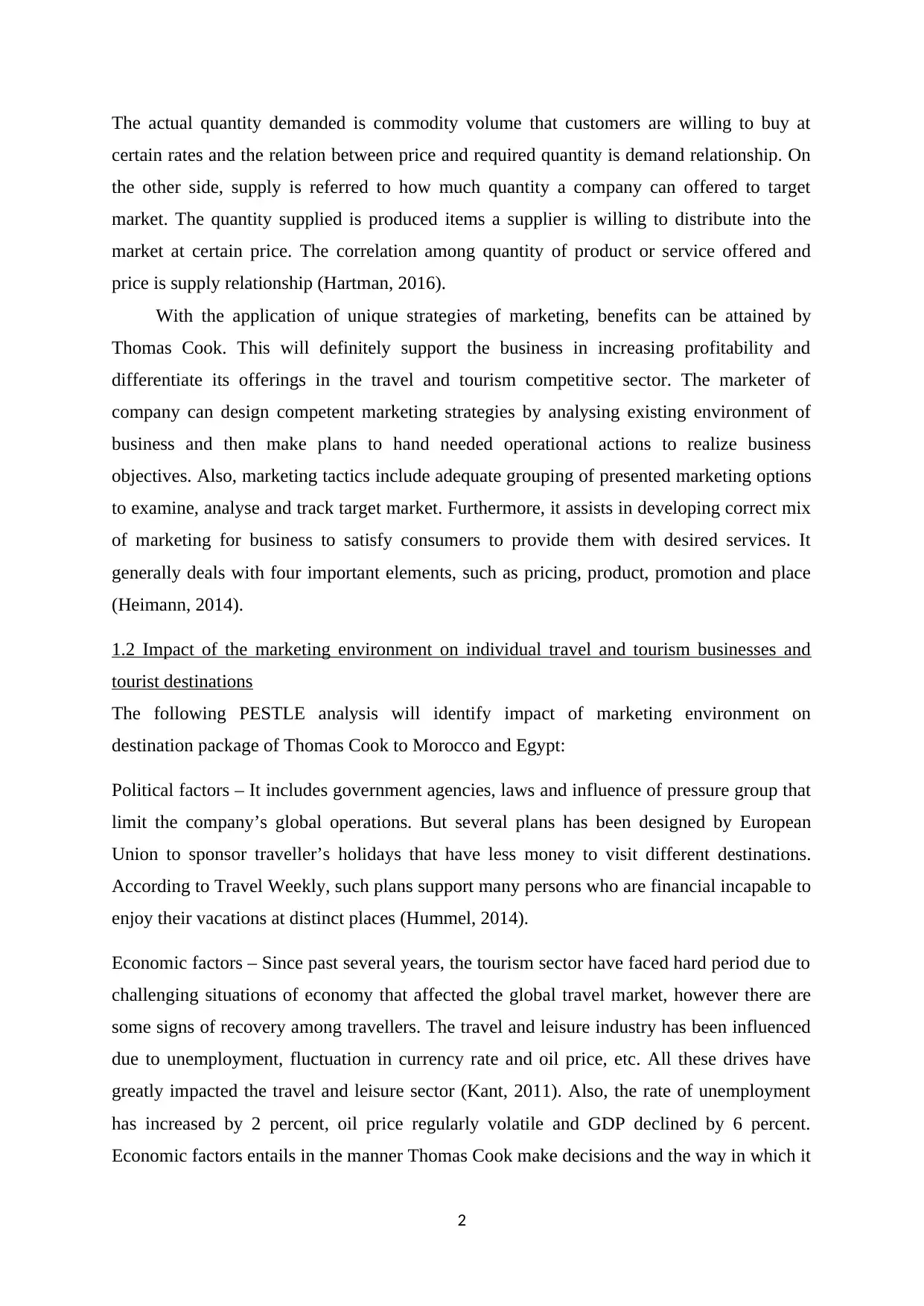
The actual quantity demanded is commodity volume that customers are willing to buy at
certain rates and the relation between price and required quantity is demand relationship. On
the other side, supply is referred to how much quantity a company can offered to target
market. The quantity supplied is produced items a supplier is willing to distribute into the
market at certain price. The correlation among quantity of product or service offered and
price is supply relationship (Hartman, 2016).
With the application of unique strategies of marketing, benefits can be attained by
Thomas Cook. This will definitely support the business in increasing profitability and
differentiate its offerings in the travel and tourism competitive sector. The marketer of
company can design competent marketing strategies by analysing existing environment of
business and then make plans to hand needed operational actions to realize business
objectives. Also, marketing tactics include adequate grouping of presented marketing options
to examine, analyse and track target market. Furthermore, it assists in developing correct mix
of marketing for business to satisfy consumers to provide them with desired services. It
generally deals with four important elements, such as pricing, product, promotion and place
(Heimann, 2014).
1.2 Impact of the marketing environment on individual travel and tourism businesses and
tourist destinations
The following PESTLE analysis will identify impact of marketing environment on
destination package of Thomas Cook to Morocco and Egypt:
Political factors – It includes government agencies, laws and influence of pressure group that
limit the company’s global operations. But several plans has been designed by European
Union to sponsor traveller’s holidays that have less money to visit different destinations.
According to Travel Weekly, such plans support many persons who are financial incapable to
enjoy their vacations at distinct places (Hummel, 2014).
Economic factors – Since past several years, the tourism sector have faced hard period due to
challenging situations of economy that affected the global travel market, however there are
some signs of recovery among travellers. The travel and leisure industry has been influenced
due to unemployment, fluctuation in currency rate and oil price, etc. All these drives have
greatly impacted the travel and leisure sector (Kant, 2011). Also, the rate of unemployment
has increased by 2 percent, oil price regularly volatile and GDP declined by 6 percent.
Economic factors entails in the manner Thomas Cook make decisions and the way in which it
2
certain rates and the relation between price and required quantity is demand relationship. On
the other side, supply is referred to how much quantity a company can offered to target
market. The quantity supplied is produced items a supplier is willing to distribute into the
market at certain price. The correlation among quantity of product or service offered and
price is supply relationship (Hartman, 2016).
With the application of unique strategies of marketing, benefits can be attained by
Thomas Cook. This will definitely support the business in increasing profitability and
differentiate its offerings in the travel and tourism competitive sector. The marketer of
company can design competent marketing strategies by analysing existing environment of
business and then make plans to hand needed operational actions to realize business
objectives. Also, marketing tactics include adequate grouping of presented marketing options
to examine, analyse and track target market. Furthermore, it assists in developing correct mix
of marketing for business to satisfy consumers to provide them with desired services. It
generally deals with four important elements, such as pricing, product, promotion and place
(Heimann, 2014).
1.2 Impact of the marketing environment on individual travel and tourism businesses and
tourist destinations
The following PESTLE analysis will identify impact of marketing environment on
destination package of Thomas Cook to Morocco and Egypt:
Political factors – It includes government agencies, laws and influence of pressure group that
limit the company’s global operations. But several plans has been designed by European
Union to sponsor traveller’s holidays that have less money to visit different destinations.
According to Travel Weekly, such plans support many persons who are financial incapable to
enjoy their vacations at distinct places (Hummel, 2014).
Economic factors – Since past several years, the tourism sector have faced hard period due to
challenging situations of economy that affected the global travel market, however there are
some signs of recovery among travellers. The travel and leisure industry has been influenced
due to unemployment, fluctuation in currency rate and oil price, etc. All these drives have
greatly impacted the travel and leisure sector (Kant, 2011). Also, the rate of unemployment
has increased by 2 percent, oil price regularly volatile and GDP declined by 6 percent.
Economic factors entails in the manner Thomas Cook make decisions and the way in which it
2
Paraphrase This Document
Need a fresh take? Get an instant paraphrase of this document with our AI Paraphraser
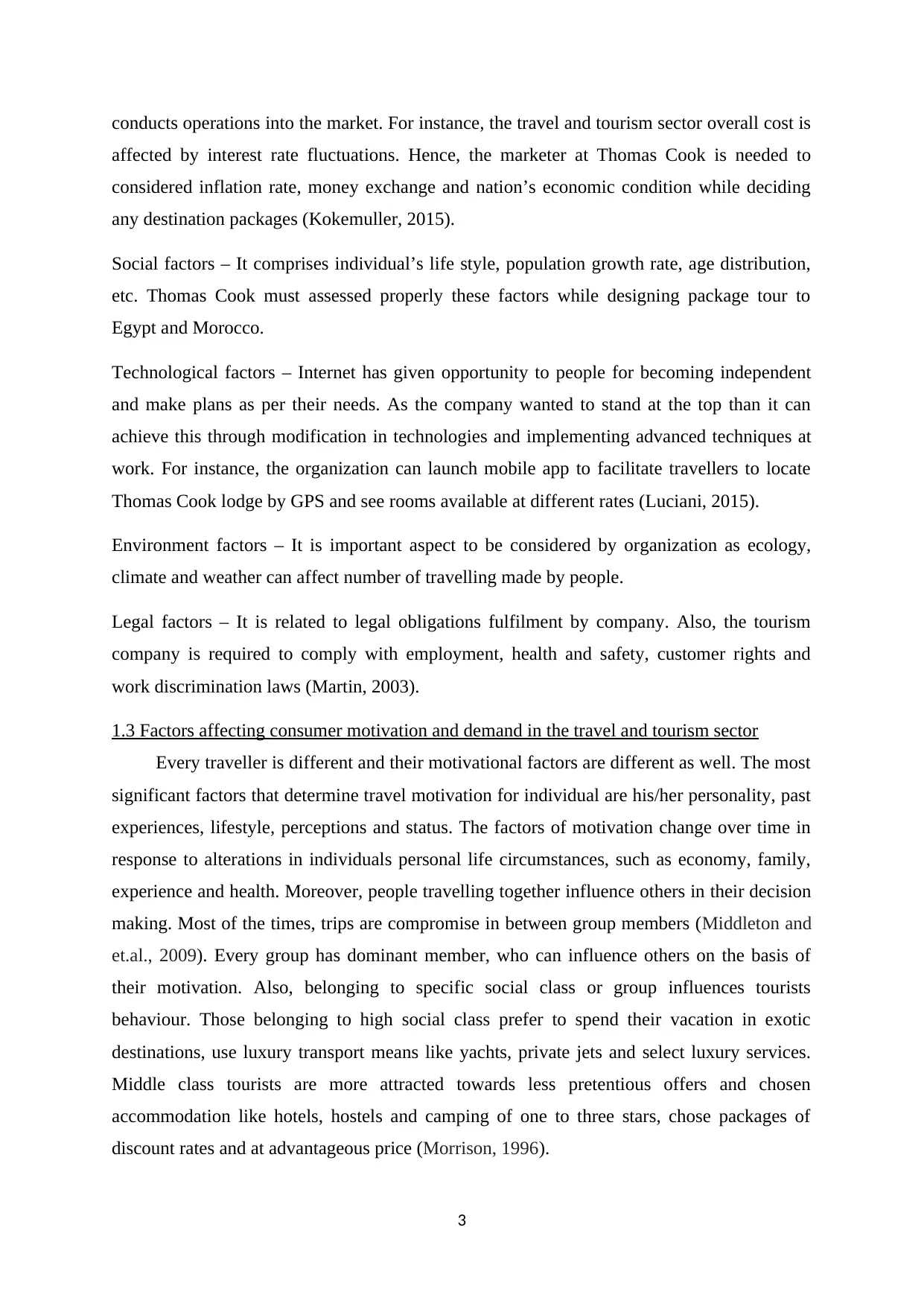
conducts operations into the market. For instance, the travel and tourism sector overall cost is
affected by interest rate fluctuations. Hence, the marketer at Thomas Cook is needed to
considered inflation rate, money exchange and nation’s economic condition while deciding
any destination packages (Kokemuller, 2015).
Social factors – It comprises individual’s life style, population growth rate, age distribution,
etc. Thomas Cook must assessed properly these factors while designing package tour to
Egypt and Morocco.
Technological factors – Internet has given opportunity to people for becoming independent
and make plans as per their needs. As the company wanted to stand at the top than it can
achieve this through modification in technologies and implementing advanced techniques at
work. For instance, the organization can launch mobile app to facilitate travellers to locate
Thomas Cook lodge by GPS and see rooms available at different rates (Luciani, 2015).
Environment factors – It is important aspect to be considered by organization as ecology,
climate and weather can affect number of travelling made by people.
Legal factors – It is related to legal obligations fulfilment by company. Also, the tourism
company is required to comply with employment, health and safety, customer rights and
work discrimination laws (Martin, 2003).
1.3 Factors affecting consumer motivation and demand in the travel and tourism sector
Every traveller is different and their motivational factors are different as well. The most
significant factors that determine travel motivation for individual are his/her personality, past
experiences, lifestyle, perceptions and status. The factors of motivation change over time in
response to alterations in individuals personal life circumstances, such as economy, family,
experience and health. Moreover, people travelling together influence others in their decision
making. Most of the times, trips are compromise in between group members (Middleton and
et.al., 2009). Every group has dominant member, who can influence others on the basis of
their motivation. Also, belonging to specific social class or group influences tourists
behaviour. Those belonging to high social class prefer to spend their vacation in exotic
destinations, use luxury transport means like yachts, private jets and select luxury services.
Middle class tourists are more attracted towards less pretentious offers and chosen
accommodation like hotels, hostels and camping of one to three stars, chose packages of
discount rates and at advantageous price (Morrison, 1996).
3
affected by interest rate fluctuations. Hence, the marketer at Thomas Cook is needed to
considered inflation rate, money exchange and nation’s economic condition while deciding
any destination packages (Kokemuller, 2015).
Social factors – It comprises individual’s life style, population growth rate, age distribution,
etc. Thomas Cook must assessed properly these factors while designing package tour to
Egypt and Morocco.
Technological factors – Internet has given opportunity to people for becoming independent
and make plans as per their needs. As the company wanted to stand at the top than it can
achieve this through modification in technologies and implementing advanced techniques at
work. For instance, the organization can launch mobile app to facilitate travellers to locate
Thomas Cook lodge by GPS and see rooms available at different rates (Luciani, 2015).
Environment factors – It is important aspect to be considered by organization as ecology,
climate and weather can affect number of travelling made by people.
Legal factors – It is related to legal obligations fulfilment by company. Also, the tourism
company is required to comply with employment, health and safety, customer rights and
work discrimination laws (Martin, 2003).
1.3 Factors affecting consumer motivation and demand in the travel and tourism sector
Every traveller is different and their motivational factors are different as well. The most
significant factors that determine travel motivation for individual are his/her personality, past
experiences, lifestyle, perceptions and status. The factors of motivation change over time in
response to alterations in individuals personal life circumstances, such as economy, family,
experience and health. Moreover, people travelling together influence others in their decision
making. Most of the times, trips are compromise in between group members (Middleton and
et.al., 2009). Every group has dominant member, who can influence others on the basis of
their motivation. Also, belonging to specific social class or group influences tourists
behaviour. Those belonging to high social class prefer to spend their vacation in exotic
destinations, use luxury transport means like yachts, private jets and select luxury services.
Middle class tourists are more attracted towards less pretentious offers and chosen
accommodation like hotels, hostels and camping of one to three stars, chose packages of
discount rates and at advantageous price (Morrison, 1996).
3
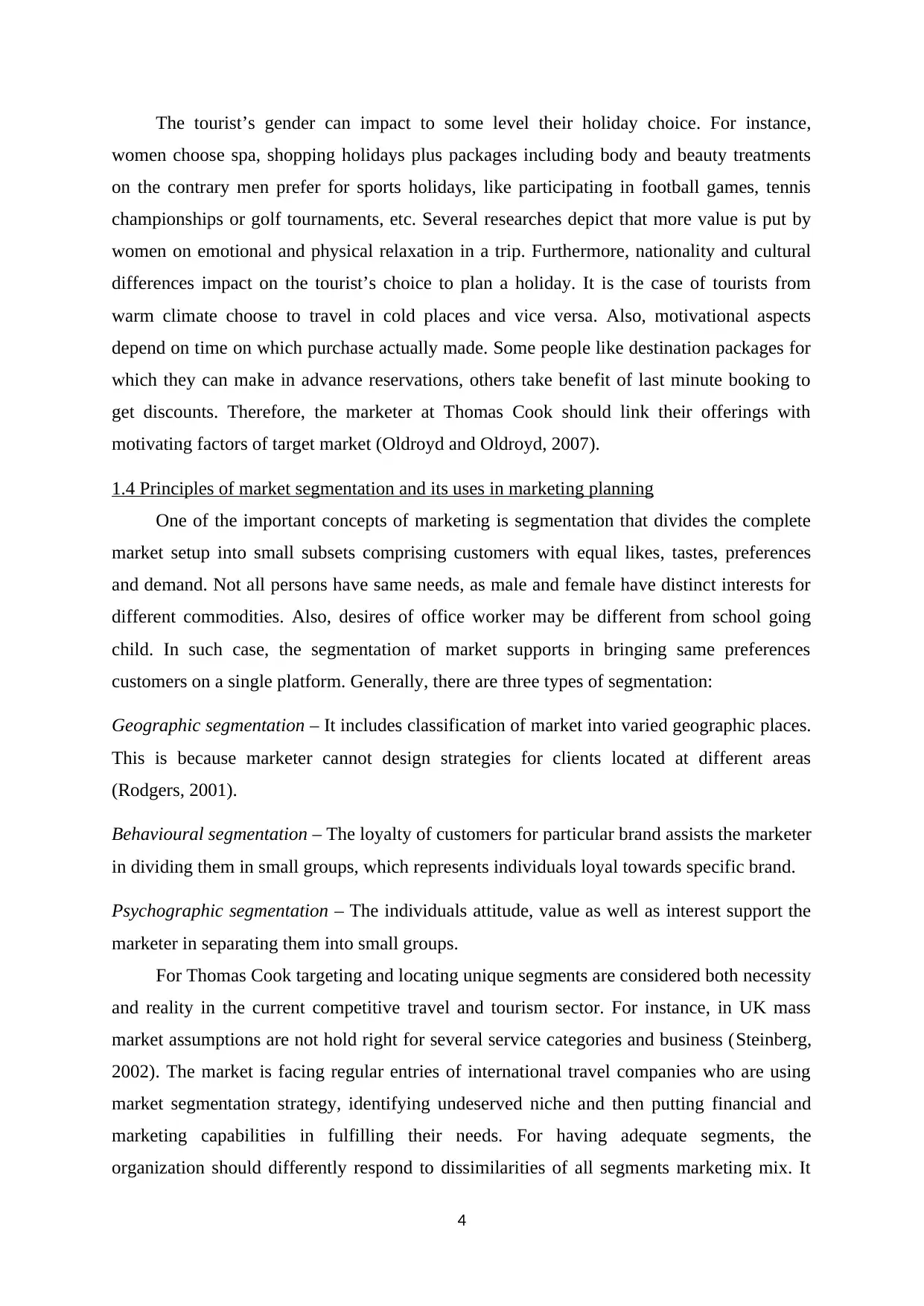
The tourist’s gender can impact to some level their holiday choice. For instance,
women choose spa, shopping holidays plus packages including body and beauty treatments
on the contrary men prefer for sports holidays, like participating in football games, tennis
championships or golf tournaments, etc. Several researches depict that more value is put by
women on emotional and physical relaxation in a trip. Furthermore, nationality and cultural
differences impact on the tourist’s choice to plan a holiday. It is the case of tourists from
warm climate choose to travel in cold places and vice versa. Also, motivational aspects
depend on time on which purchase actually made. Some people like destination packages for
which they can make in advance reservations, others take benefit of last minute booking to
get discounts. Therefore, the marketer at Thomas Cook should link their offerings with
motivating factors of target market (Oldroyd and Oldroyd, 2007).
1.4 Principles of market segmentation and its uses in marketing planning
One of the important concepts of marketing is segmentation that divides the complete
market setup into small subsets comprising customers with equal likes, tastes, preferences
and demand. Not all persons have same needs, as male and female have distinct interests for
different commodities. Also, desires of office worker may be different from school going
child. In such case, the segmentation of market supports in bringing same preferences
customers on a single platform. Generally, there are three types of segmentation:
Geographic segmentation – It includes classification of market into varied geographic places.
This is because marketer cannot design strategies for clients located at different areas
(Rodgers, 2001).
Behavioural segmentation – The loyalty of customers for particular brand assists the marketer
in dividing them in small groups, which represents individuals loyal towards specific brand.
Psychographic segmentation – The individuals attitude, value as well as interest support the
marketer in separating them into small groups.
For Thomas Cook targeting and locating unique segments are considered both necessity
and reality in the current competitive travel and tourism sector. For instance, in UK mass
market assumptions are not hold right for several service categories and business (Steinberg,
2002). The market is facing regular entries of international travel companies who are using
market segmentation strategy, identifying undeserved niche and then putting financial and
marketing capabilities in fulfilling their needs. For having adequate segments, the
organization should differently respond to dissimilarities of all segments marketing mix. It
4
women choose spa, shopping holidays plus packages including body and beauty treatments
on the contrary men prefer for sports holidays, like participating in football games, tennis
championships or golf tournaments, etc. Several researches depict that more value is put by
women on emotional and physical relaxation in a trip. Furthermore, nationality and cultural
differences impact on the tourist’s choice to plan a holiday. It is the case of tourists from
warm climate choose to travel in cold places and vice versa. Also, motivational aspects
depend on time on which purchase actually made. Some people like destination packages for
which they can make in advance reservations, others take benefit of last minute booking to
get discounts. Therefore, the marketer at Thomas Cook should link their offerings with
motivating factors of target market (Oldroyd and Oldroyd, 2007).
1.4 Principles of market segmentation and its uses in marketing planning
One of the important concepts of marketing is segmentation that divides the complete
market setup into small subsets comprising customers with equal likes, tastes, preferences
and demand. Not all persons have same needs, as male and female have distinct interests for
different commodities. Also, desires of office worker may be different from school going
child. In such case, the segmentation of market supports in bringing same preferences
customers on a single platform. Generally, there are three types of segmentation:
Geographic segmentation – It includes classification of market into varied geographic places.
This is because marketer cannot design strategies for clients located at different areas
(Rodgers, 2001).
Behavioural segmentation – The loyalty of customers for particular brand assists the marketer
in dividing them in small groups, which represents individuals loyal towards specific brand.
Psychographic segmentation – The individuals attitude, value as well as interest support the
marketer in separating them into small groups.
For Thomas Cook targeting and locating unique segments are considered both necessity
and reality in the current competitive travel and tourism sector. For instance, in UK mass
market assumptions are not hold right for several service categories and business (Steinberg,
2002). The market is facing regular entries of international travel companies who are using
market segmentation strategy, identifying undeserved niche and then putting financial and
marketing capabilities in fulfilling their needs. For having adequate segments, the
organization should differently respond to dissimilarities of all segments marketing mix. It
4
⊘ This is a preview!⊘
Do you want full access?
Subscribe today to unlock all pages.

Trusted by 1+ million students worldwide
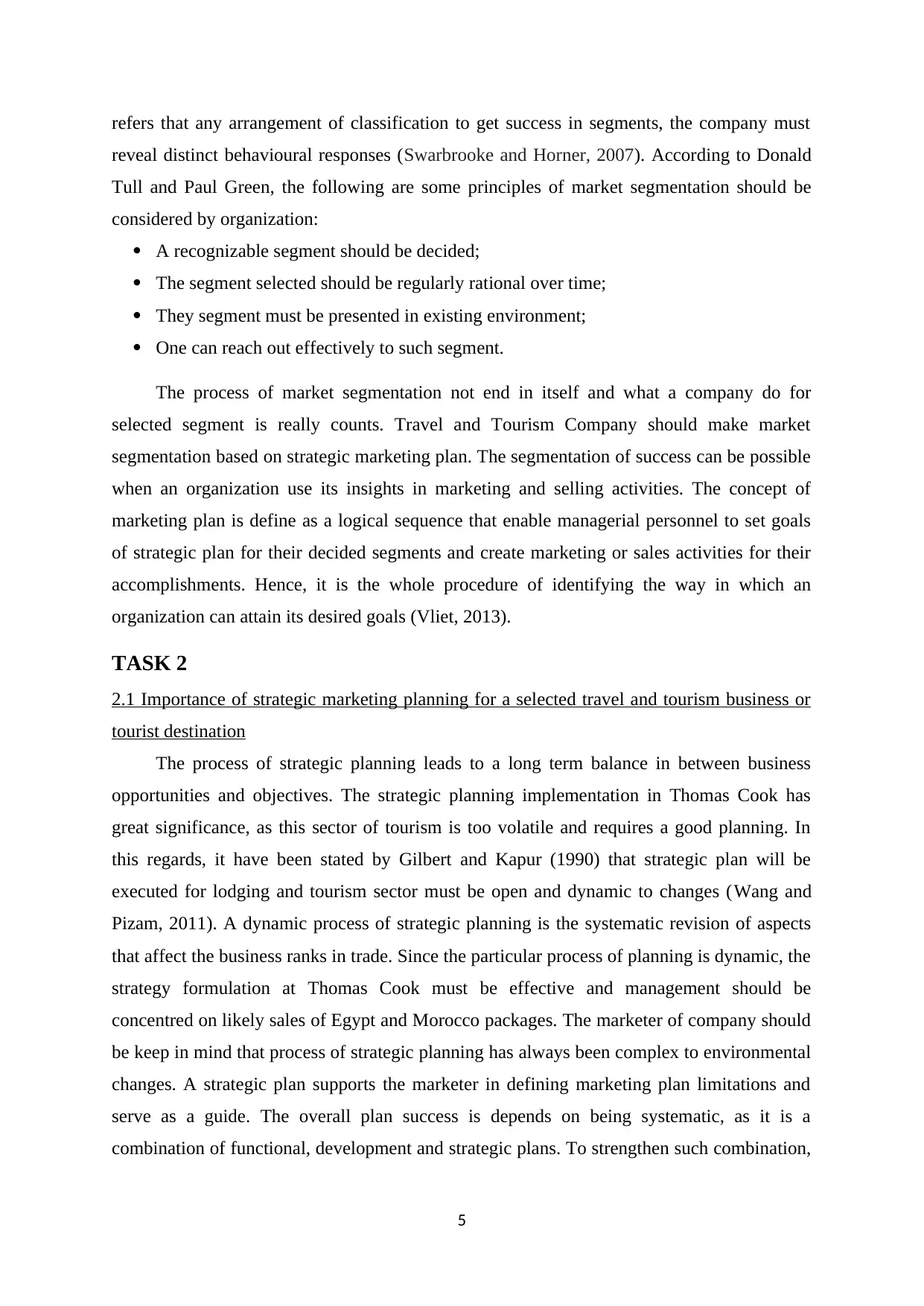
refers that any arrangement of classification to get success in segments, the company must
reveal distinct behavioural responses (Swarbrooke and Horner, 2007). According to Donald
Tull and Paul Green, the following are some principles of market segmentation should be
considered by organization:
A recognizable segment should be decided;
The segment selected should be regularly rational over time;
They segment must be presented in existing environment;
One can reach out effectively to such segment.
The process of market segmentation not end in itself and what a company do for
selected segment is really counts. Travel and Tourism Company should make market
segmentation based on strategic marketing plan. The segmentation of success can be possible
when an organization use its insights in marketing and selling activities. The concept of
marketing plan is define as a logical sequence that enable managerial personnel to set goals
of strategic plan for their decided segments and create marketing or sales activities for their
accomplishments. Hence, it is the whole procedure of identifying the way in which an
organization can attain its desired goals (Vliet, 2013).
TASK 2
2.1 Importance of strategic marketing planning for a selected travel and tourism business or
tourist destination
The process of strategic planning leads to a long term balance in between business
opportunities and objectives. The strategic planning implementation in Thomas Cook has
great significance, as this sector of tourism is too volatile and requires a good planning. In
this regards, it have been stated by Gilbert and Kapur (1990) that strategic plan will be
executed for lodging and tourism sector must be open and dynamic to changes (Wang and
Pizam, 2011). A dynamic process of strategic planning is the systematic revision of aspects
that affect the business ranks in trade. Since the particular process of planning is dynamic, the
strategy formulation at Thomas Cook must be effective and management should be
concentred on likely sales of Egypt and Morocco packages. The marketer of company should
be keep in mind that process of strategic planning has always been complex to environmental
changes. A strategic plan supports the marketer in defining marketing plan limitations and
serve as a guide. The overall plan success is depends on being systematic, as it is a
combination of functional, development and strategic plans. To strengthen such combination,
5
reveal distinct behavioural responses (Swarbrooke and Horner, 2007). According to Donald
Tull and Paul Green, the following are some principles of market segmentation should be
considered by organization:
A recognizable segment should be decided;
The segment selected should be regularly rational over time;
They segment must be presented in existing environment;
One can reach out effectively to such segment.
The process of market segmentation not end in itself and what a company do for
selected segment is really counts. Travel and Tourism Company should make market
segmentation based on strategic marketing plan. The segmentation of success can be possible
when an organization use its insights in marketing and selling activities. The concept of
marketing plan is define as a logical sequence that enable managerial personnel to set goals
of strategic plan for their decided segments and create marketing or sales activities for their
accomplishments. Hence, it is the whole procedure of identifying the way in which an
organization can attain its desired goals (Vliet, 2013).
TASK 2
2.1 Importance of strategic marketing planning for a selected travel and tourism business or
tourist destination
The process of strategic planning leads to a long term balance in between business
opportunities and objectives. The strategic planning implementation in Thomas Cook has
great significance, as this sector of tourism is too volatile and requires a good planning. In
this regards, it have been stated by Gilbert and Kapur (1990) that strategic plan will be
executed for lodging and tourism sector must be open and dynamic to changes (Wang and
Pizam, 2011). A dynamic process of strategic planning is the systematic revision of aspects
that affect the business ranks in trade. Since the particular process of planning is dynamic, the
strategy formulation at Thomas Cook must be effective and management should be
concentred on likely sales of Egypt and Morocco packages. The marketer of company should
be keep in mind that process of strategic planning has always been complex to environmental
changes. A strategic plan supports the marketer in defining marketing plan limitations and
serve as a guide. The overall plan success is depends on being systematic, as it is a
combination of functional, development and strategic plans. To strengthen such combination,
5
Paraphrase This Document
Need a fresh take? Get an instant paraphrase of this document with our AI Paraphraser
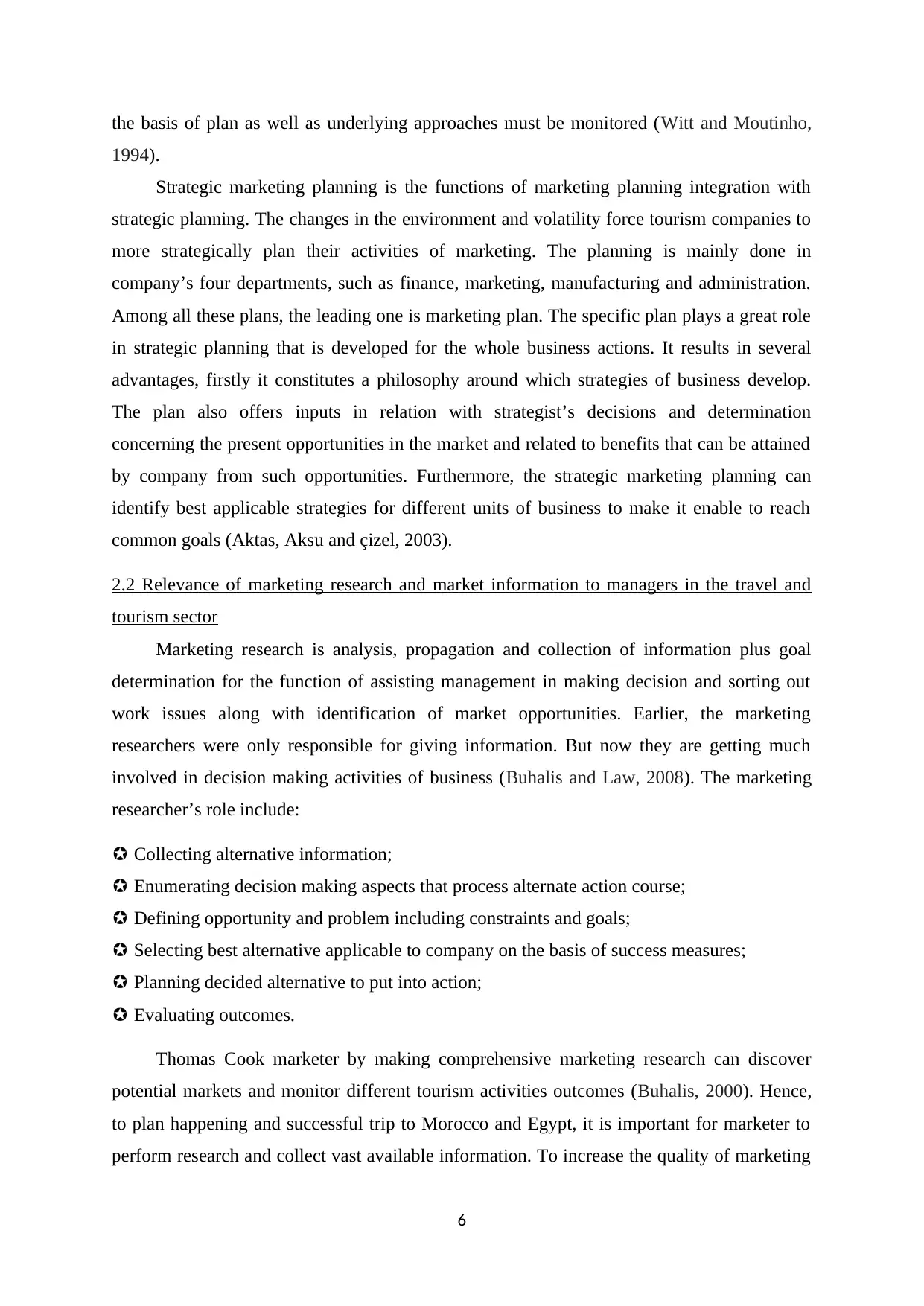
the basis of plan as well as underlying approaches must be monitored (Witt and Moutinho,
1994).
Strategic marketing planning is the functions of marketing planning integration with
strategic planning. The changes in the environment and volatility force tourism companies to
more strategically plan their activities of marketing. The planning is mainly done in
company’s four departments, such as finance, marketing, manufacturing and administration.
Among all these plans, the leading one is marketing plan. The specific plan plays a great role
in strategic planning that is developed for the whole business actions. It results in several
advantages, firstly it constitutes a philosophy around which strategies of business develop.
The plan also offers inputs in relation with strategist’s decisions and determination
concerning the present opportunities in the market and related to benefits that can be attained
by company from such opportunities. Furthermore, the strategic marketing planning can
identify best applicable strategies for different units of business to make it enable to reach
common goals (Aktas, Aksu and çizel, 2003).
2.2 Relevance of marketing research and market information to managers in the travel and
tourism sector
Marketing research is analysis, propagation and collection of information plus goal
determination for the function of assisting management in making decision and sorting out
work issues along with identification of market opportunities. Earlier, the marketing
researchers were only responsible for giving information. But now they are getting much
involved in decision making activities of business (Buhalis and Law, 2008). The marketing
researcher’s role include:
Collecting alternative information;
Enumerating decision making aspects that process alternate action course;
Defining opportunity and problem including constraints and goals;
Selecting best alternative applicable to company on the basis of success measures;
Planning decided alternative to put into action;
Evaluating outcomes.
Thomas Cook marketer by making comprehensive marketing research can discover
potential markets and monitor different tourism activities outcomes (Buhalis, 2000). Hence,
to plan happening and successful trip to Morocco and Egypt, it is important for marketer to
perform research and collect vast available information. To increase the quality of marketing
6
1994).
Strategic marketing planning is the functions of marketing planning integration with
strategic planning. The changes in the environment and volatility force tourism companies to
more strategically plan their activities of marketing. The planning is mainly done in
company’s four departments, such as finance, marketing, manufacturing and administration.
Among all these plans, the leading one is marketing plan. The specific plan plays a great role
in strategic planning that is developed for the whole business actions. It results in several
advantages, firstly it constitutes a philosophy around which strategies of business develop.
The plan also offers inputs in relation with strategist’s decisions and determination
concerning the present opportunities in the market and related to benefits that can be attained
by company from such opportunities. Furthermore, the strategic marketing planning can
identify best applicable strategies for different units of business to make it enable to reach
common goals (Aktas, Aksu and çizel, 2003).
2.2 Relevance of marketing research and market information to managers in the travel and
tourism sector
Marketing research is analysis, propagation and collection of information plus goal
determination for the function of assisting management in making decision and sorting out
work issues along with identification of market opportunities. Earlier, the marketing
researchers were only responsible for giving information. But now they are getting much
involved in decision making activities of business (Buhalis and Law, 2008). The marketing
researcher’s role include:
Collecting alternative information;
Enumerating decision making aspects that process alternate action course;
Defining opportunity and problem including constraints and goals;
Selecting best alternative applicable to company on the basis of success measures;
Planning decided alternative to put into action;
Evaluating outcomes.
Thomas Cook marketer by making comprehensive marketing research can discover
potential markets and monitor different tourism activities outcomes (Buhalis, 2000). Hence,
to plan happening and successful trip to Morocco and Egypt, it is important for marketer to
perform research and collect vast available information. To increase the quality of marketing
6
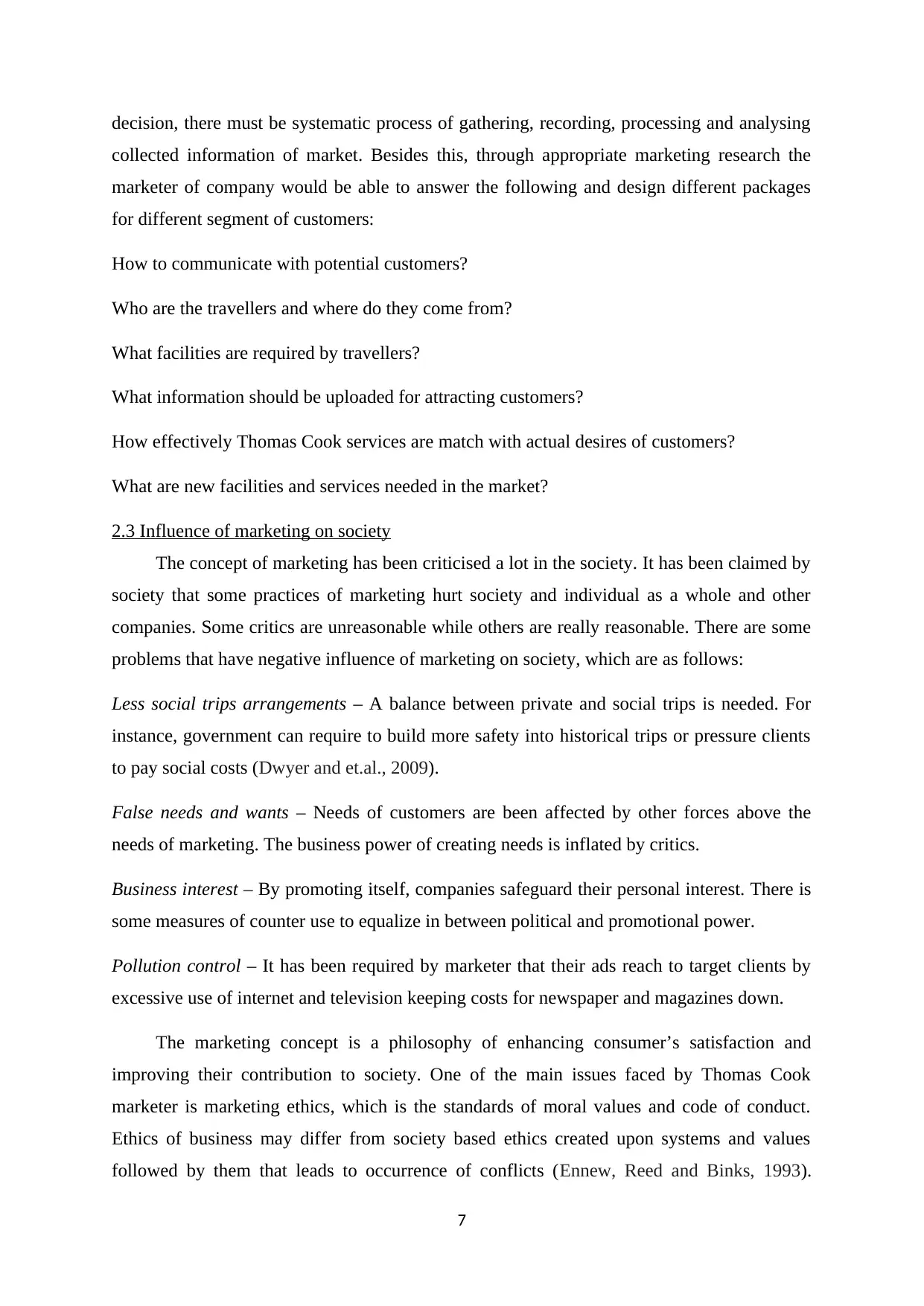
decision, there must be systematic process of gathering, recording, processing and analysing
collected information of market. Besides this, through appropriate marketing research the
marketer of company would be able to answer the following and design different packages
for different segment of customers:
How to communicate with potential customers?
Who are the travellers and where do they come from?
What facilities are required by travellers?
What information should be uploaded for attracting customers?
How effectively Thomas Cook services are match with actual desires of customers?
What are new facilities and services needed in the market?
2.3 Influence of marketing on society
The concept of marketing has been criticised a lot in the society. It has been claimed by
society that some practices of marketing hurt society and individual as a whole and other
companies. Some critics are unreasonable while others are really reasonable. There are some
problems that have negative influence of marketing on society, which are as follows:
Less social trips arrangements – A balance between private and social trips is needed. For
instance, government can require to build more safety into historical trips or pressure clients
to pay social costs (Dwyer and et.al., 2009).
False needs and wants – Needs of customers are been affected by other forces above the
needs of marketing. The business power of creating needs is inflated by critics.
Business interest – By promoting itself, companies safeguard their personal interest. There is
some measures of counter use to equalize in between political and promotional power.
Pollution control – It has been required by marketer that their ads reach to target clients by
excessive use of internet and television keeping costs for newspaper and magazines down.
The marketing concept is a philosophy of enhancing consumer’s satisfaction and
improving their contribution to society. One of the main issues faced by Thomas Cook
marketer is marketing ethics, which is the standards of moral values and code of conduct.
Ethics of business may differ from society based ethics created upon systems and values
followed by them that leads to occurrence of conflicts (Ennew, Reed and Binks, 1993).
7
collected information of market. Besides this, through appropriate marketing research the
marketer of company would be able to answer the following and design different packages
for different segment of customers:
How to communicate with potential customers?
Who are the travellers and where do they come from?
What facilities are required by travellers?
What information should be uploaded for attracting customers?
How effectively Thomas Cook services are match with actual desires of customers?
What are new facilities and services needed in the market?
2.3 Influence of marketing on society
The concept of marketing has been criticised a lot in the society. It has been claimed by
society that some practices of marketing hurt society and individual as a whole and other
companies. Some critics are unreasonable while others are really reasonable. There are some
problems that have negative influence of marketing on society, which are as follows:
Less social trips arrangements – A balance between private and social trips is needed. For
instance, government can require to build more safety into historical trips or pressure clients
to pay social costs (Dwyer and et.al., 2009).
False needs and wants – Needs of customers are been affected by other forces above the
needs of marketing. The business power of creating needs is inflated by critics.
Business interest – By promoting itself, companies safeguard their personal interest. There is
some measures of counter use to equalize in between political and promotional power.
Pollution control – It has been required by marketer that their ads reach to target clients by
excessive use of internet and television keeping costs for newspaper and magazines down.
The marketing concept is a philosophy of enhancing consumer’s satisfaction and
improving their contribution to society. One of the main issues faced by Thomas Cook
marketer is marketing ethics, which is the standards of moral values and code of conduct.
Ethics of business may differ from society based ethics created upon systems and values
followed by them that leads to occurrence of conflicts (Ennew, Reed and Binks, 1993).
7
⊘ This is a preview!⊘
Do you want full access?
Subscribe today to unlock all pages.

Trusted by 1+ million students worldwide
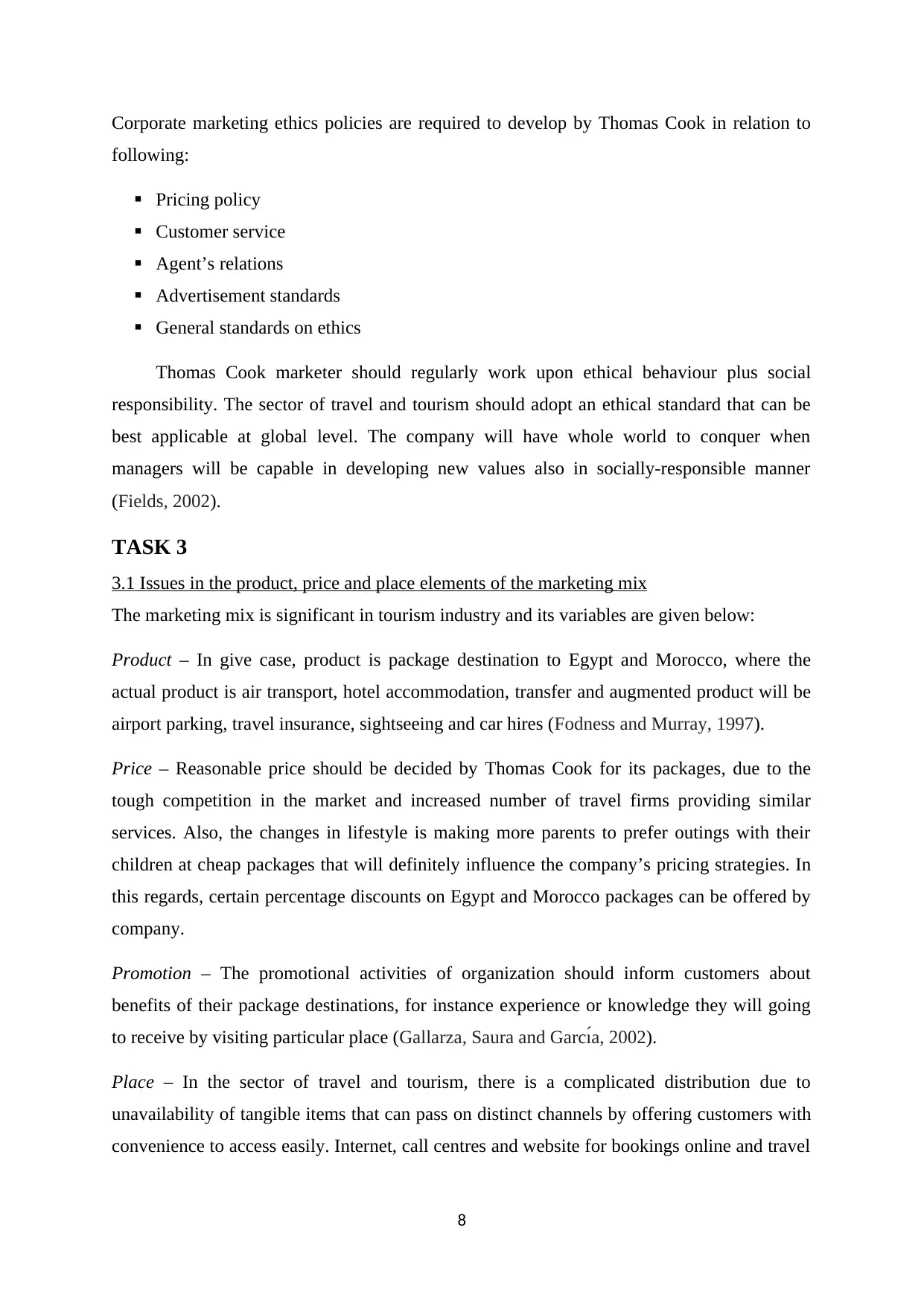
Corporate marketing ethics policies are required to develop by Thomas Cook in relation to
following:
Pricing policy
Customer service
Agent’s relations
Advertisement standards
General standards on ethics
Thomas Cook marketer should regularly work upon ethical behaviour plus social
responsibility. The sector of travel and tourism should adopt an ethical standard that can be
best applicable at global level. The company will have whole world to conquer when
managers will be capable in developing new values also in socially-responsible manner
(Fields, 2002).
TASK 3
3.1 Issues in the product, price and place elements of the marketing mix
The marketing mix is significant in tourism industry and its variables are given below:
Product – In give case, product is package destination to Egypt and Morocco, where the
actual product is air transport, hotel accommodation, transfer and augmented product will be
airport parking, travel insurance, sightseeing and car hires (Fodness and Murray, 1997).
Price – Reasonable price should be decided by Thomas Cook for its packages, due to the
tough competition in the market and increased number of travel firms providing similar
services. Also, the changes in lifestyle is making more parents to prefer outings with their
children at cheap packages that will definitely influence the company’s pricing strategies. In
this regards, certain percentage discounts on Egypt and Morocco packages can be offered by
company.
Promotion – The promotional activities of organization should inform customers about
benefits of their package destinations, for instance experience or knowledge they will going
to receive by visiting particular place (Gallarza, Saura and Garcı́a, 2002).
Place – In the sector of travel and tourism, there is a complicated distribution due to
unavailability of tangible items that can pass on distinct channels by offering customers with
convenience to access easily. Internet, call centres and website for bookings online and travel
8
following:
Pricing policy
Customer service
Agent’s relations
Advertisement standards
General standards on ethics
Thomas Cook marketer should regularly work upon ethical behaviour plus social
responsibility. The sector of travel and tourism should adopt an ethical standard that can be
best applicable at global level. The company will have whole world to conquer when
managers will be capable in developing new values also in socially-responsible manner
(Fields, 2002).
TASK 3
3.1 Issues in the product, price and place elements of the marketing mix
The marketing mix is significant in tourism industry and its variables are given below:
Product – In give case, product is package destination to Egypt and Morocco, where the
actual product is air transport, hotel accommodation, transfer and augmented product will be
airport parking, travel insurance, sightseeing and car hires (Fodness and Murray, 1997).
Price – Reasonable price should be decided by Thomas Cook for its packages, due to the
tough competition in the market and increased number of travel firms providing similar
services. Also, the changes in lifestyle is making more parents to prefer outings with their
children at cheap packages that will definitely influence the company’s pricing strategies. In
this regards, certain percentage discounts on Egypt and Morocco packages can be offered by
company.
Promotion – The promotional activities of organization should inform customers about
benefits of their package destinations, for instance experience or knowledge they will going
to receive by visiting particular place (Gallarza, Saura and Garcı́a, 2002).
Place – In the sector of travel and tourism, there is a complicated distribution due to
unavailability of tangible items that can pass on distinct channels by offering customers with
convenience to access easily. Internet, call centres and website for bookings online and travel
8
Paraphrase This Document
Need a fresh take? Get an instant paraphrase of this document with our AI Paraphraser
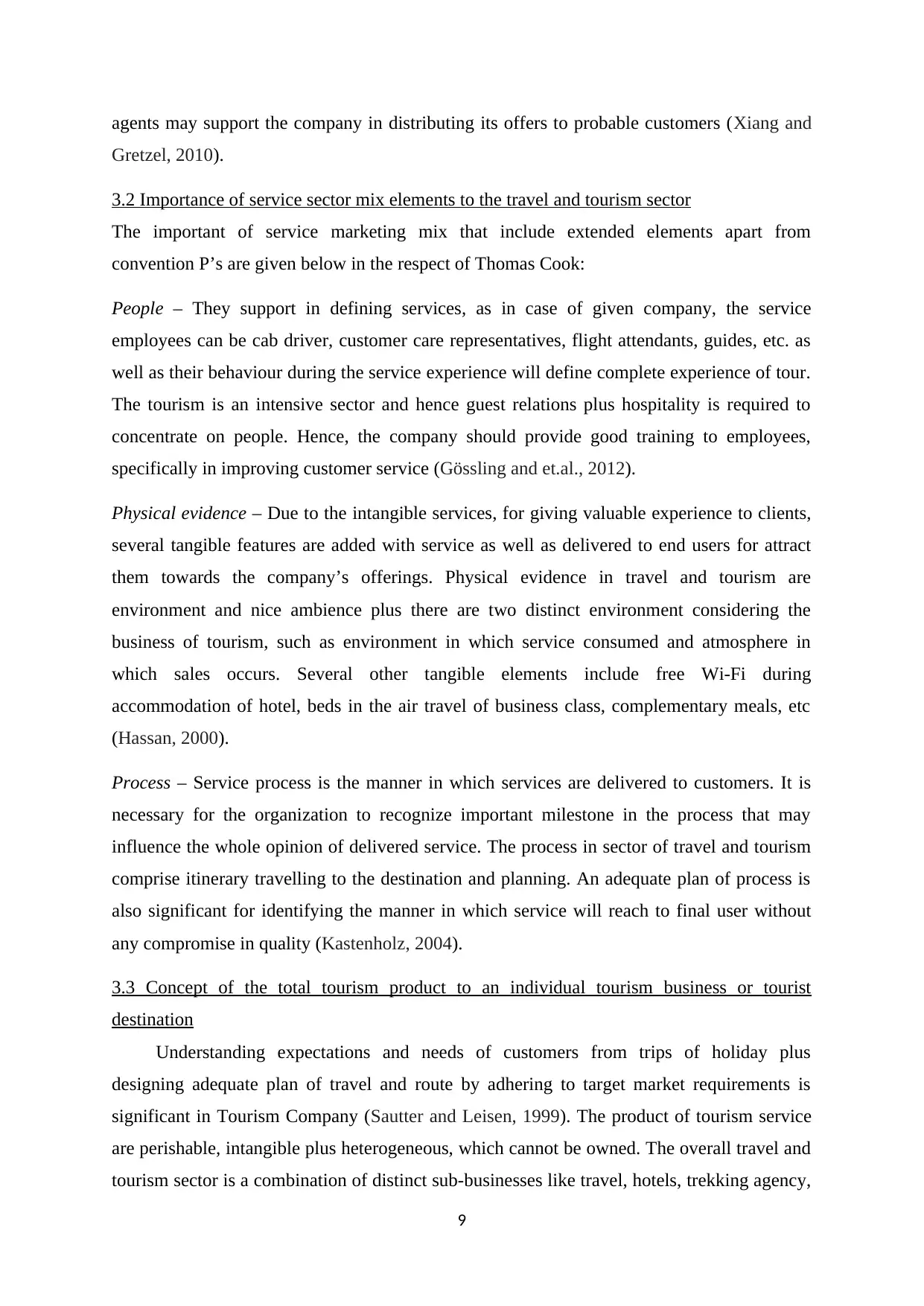
agents may support the company in distributing its offers to probable customers (Xiang and
Gretzel, 2010).
3.2 Importance of service sector mix elements to the travel and tourism sector
The important of service marketing mix that include extended elements apart from
convention P’s are given below in the respect of Thomas Cook:
People – They support in defining services, as in case of given company, the service
employees can be cab driver, customer care representatives, flight attendants, guides, etc. as
well as their behaviour during the service experience will define complete experience of tour.
The tourism is an intensive sector and hence guest relations plus hospitality is required to
concentrate on people. Hence, the company should provide good training to employees,
specifically in improving customer service (Gössling and et.al., 2012).
Physical evidence – Due to the intangible services, for giving valuable experience to clients,
several tangible features are added with service as well as delivered to end users for attract
them towards the company’s offerings. Physical evidence in travel and tourism are
environment and nice ambience plus there are two distinct environment considering the
business of tourism, such as environment in which service consumed and atmosphere in
which sales occurs. Several other tangible elements include free Wi-Fi during
accommodation of hotel, beds in the air travel of business class, complementary meals, etc
(Hassan, 2000).
Process – Service process is the manner in which services are delivered to customers. It is
necessary for the organization to recognize important milestone in the process that may
influence the whole opinion of delivered service. The process in sector of travel and tourism
comprise itinerary travelling to the destination and planning. An adequate plan of process is
also significant for identifying the manner in which service will reach to final user without
any compromise in quality (Kastenholz, 2004).
3.3 Concept of the total tourism product to an individual tourism business or tourist
destination
Understanding expectations and needs of customers from trips of holiday plus
designing adequate plan of travel and route by adhering to target market requirements is
significant in Tourism Company (Sautter and Leisen, 1999). The product of tourism service
are perishable, intangible plus heterogeneous, which cannot be owned. The overall travel and
tourism sector is a combination of distinct sub-businesses like travel, hotels, trekking agency,
9
Gretzel, 2010).
3.2 Importance of service sector mix elements to the travel and tourism sector
The important of service marketing mix that include extended elements apart from
convention P’s are given below in the respect of Thomas Cook:
People – They support in defining services, as in case of given company, the service
employees can be cab driver, customer care representatives, flight attendants, guides, etc. as
well as their behaviour during the service experience will define complete experience of tour.
The tourism is an intensive sector and hence guest relations plus hospitality is required to
concentrate on people. Hence, the company should provide good training to employees,
specifically in improving customer service (Gössling and et.al., 2012).
Physical evidence – Due to the intangible services, for giving valuable experience to clients,
several tangible features are added with service as well as delivered to end users for attract
them towards the company’s offerings. Physical evidence in travel and tourism are
environment and nice ambience plus there are two distinct environment considering the
business of tourism, such as environment in which service consumed and atmosphere in
which sales occurs. Several other tangible elements include free Wi-Fi during
accommodation of hotel, beds in the air travel of business class, complementary meals, etc
(Hassan, 2000).
Process – Service process is the manner in which services are delivered to customers. It is
necessary for the organization to recognize important milestone in the process that may
influence the whole opinion of delivered service. The process in sector of travel and tourism
comprise itinerary travelling to the destination and planning. An adequate plan of process is
also significant for identifying the manner in which service will reach to final user without
any compromise in quality (Kastenholz, 2004).
3.3 Concept of the total tourism product to an individual tourism business or tourist
destination
Understanding expectations and needs of customers from trips of holiday plus
designing adequate plan of travel and route by adhering to target market requirements is
significant in Tourism Company (Sautter and Leisen, 1999). The product of tourism service
are perishable, intangible plus heterogeneous, which cannot be owned. The overall travel and
tourism sector is a combination of distinct sub-businesses like travel, hotels, trekking agency,
9
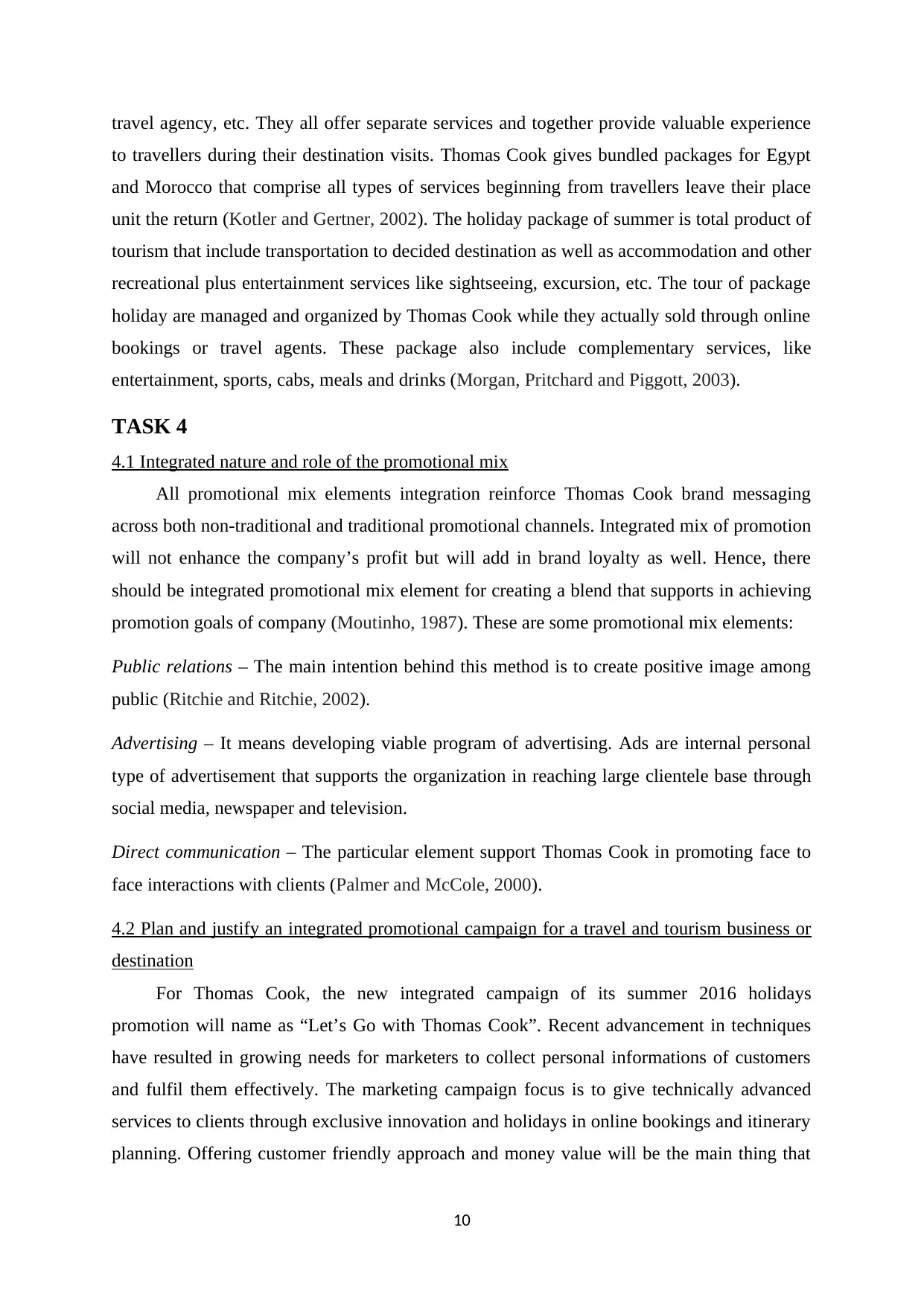
travel agency, etc. They all offer separate services and together provide valuable experience
to travellers during their destination visits. Thomas Cook gives bundled packages for Egypt
and Morocco that comprise all types of services beginning from travellers leave their place
unit the return (Kotler and Gertner, 2002). The holiday package of summer is total product of
tourism that include transportation to decided destination as well as accommodation and other
recreational plus entertainment services like sightseeing, excursion, etc. The tour of package
holiday are managed and organized by Thomas Cook while they actually sold through online
bookings or travel agents. These package also include complementary services, like
entertainment, sports, cabs, meals and drinks (Morgan, Pritchard and Piggott, 2003).
TASK 4
4.1 Integrated nature and role of the promotional mix
All promotional mix elements integration reinforce Thomas Cook brand messaging
across both non-traditional and traditional promotional channels. Integrated mix of promotion
will not enhance the company’s profit but will add in brand loyalty as well. Hence, there
should be integrated promotional mix element for creating a blend that supports in achieving
promotion goals of company (Moutinho, 1987). These are some promotional mix elements:
Public relations – The main intention behind this method is to create positive image among
public (Ritchie and Ritchie, 2002).
Advertising – It means developing viable program of advertising. Ads are internal personal
type of advertisement that supports the organization in reaching large clientele base through
social media, newspaper and television.
Direct communication – The particular element support Thomas Cook in promoting face to
face interactions with clients (Palmer and McCole, 2000).
4.2 Plan and justify an integrated promotional campaign for a travel and tourism business or
destination
For Thomas Cook, the new integrated campaign of its summer 2016 holidays
promotion will name as “Let’s Go with Thomas Cook”. Recent advancement in techniques
have resulted in growing needs for marketers to collect personal informations of customers
and fulfil them effectively. The marketing campaign focus is to give technically advanced
services to clients through exclusive innovation and holidays in online bookings and itinerary
planning. Offering customer friendly approach and money value will be the main thing that
10
to travellers during their destination visits. Thomas Cook gives bundled packages for Egypt
and Morocco that comprise all types of services beginning from travellers leave their place
unit the return (Kotler and Gertner, 2002). The holiday package of summer is total product of
tourism that include transportation to decided destination as well as accommodation and other
recreational plus entertainment services like sightseeing, excursion, etc. The tour of package
holiday are managed and organized by Thomas Cook while they actually sold through online
bookings or travel agents. These package also include complementary services, like
entertainment, sports, cabs, meals and drinks (Morgan, Pritchard and Piggott, 2003).
TASK 4
4.1 Integrated nature and role of the promotional mix
All promotional mix elements integration reinforce Thomas Cook brand messaging
across both non-traditional and traditional promotional channels. Integrated mix of promotion
will not enhance the company’s profit but will add in brand loyalty as well. Hence, there
should be integrated promotional mix element for creating a blend that supports in achieving
promotion goals of company (Moutinho, 1987). These are some promotional mix elements:
Public relations – The main intention behind this method is to create positive image among
public (Ritchie and Ritchie, 2002).
Advertising – It means developing viable program of advertising. Ads are internal personal
type of advertisement that supports the organization in reaching large clientele base through
social media, newspaper and television.
Direct communication – The particular element support Thomas Cook in promoting face to
face interactions with clients (Palmer and McCole, 2000).
4.2 Plan and justify an integrated promotional campaign for a travel and tourism business or
destination
For Thomas Cook, the new integrated campaign of its summer 2016 holidays
promotion will name as “Let’s Go with Thomas Cook”. Recent advancement in techniques
have resulted in growing needs for marketers to collect personal informations of customers
and fulfil them effectively. The marketing campaign focus is to give technically advanced
services to clients through exclusive innovation and holidays in online bookings and itinerary
planning. Offering customer friendly approach and money value will be the main thing that
10
⊘ This is a preview!⊘
Do you want full access?
Subscribe today to unlock all pages.

Trusted by 1+ million students worldwide
1 out of 16
Related Documents
Your All-in-One AI-Powered Toolkit for Academic Success.
+13062052269
info@desklib.com
Available 24*7 on WhatsApp / Email
![[object Object]](/_next/static/media/star-bottom.7253800d.svg)
Unlock your academic potential
Copyright © 2020–2026 A2Z Services. All Rights Reserved. Developed and managed by ZUCOL.





